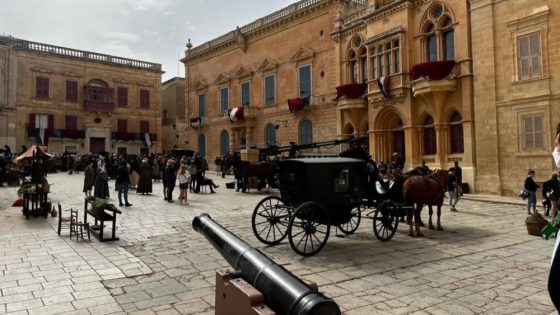Over the last century, the small but mighty island Republic of Malta has cemented itself as an appealing global destination for major film productions, with features such as Ridley Scott’s “Gladiator,” Robert Altaman’s “Popeye,” and Steven Spielberg’s “Munich” shooting there. Scott recently wrapped production on the long-awaited follow-up to his 2000 Roman epic, and the country is prepping for the upcoming shoot of the newest installment of the “Jurassic World” franchise.
Speaking with Variety, director and co-founder of Maltese service provider Valletta Pictures, Joshua Cassar Gaspar, said that the requests to film on the island have “come in like crazy” following the U.S. strikes in 2023. “It’s an incredibly busy time. The next two years will be huge for us.”
“The strikes didn’t affect us because the independent productions kept going, and many of us in Malta service TV shows, which were also unaffected,” Gaspar continued. Other producers and service providers in Malta echo this sentiment, highlighting their advantage in terms of not being as Hollywood-dependent as some of its European counterparts, like the U.K.
“When productions like ‘Gladiator 2’ had to shut down because of the strikes, most of our crew went on to work on other independent productions,” said Winston Azzopardi, film producer and founder of Latina Pictures. Azzopardi, who recently worked on productions such as Ridley Scott’s “Napoleon” and “The Last Voyage of the Demeter,” emphasized how the country has benefited from a hefty 40% tax rebate introduced early in 2023.
“The main attraction is the 40%, no question about it. Some people choose Malta for the rebate before they even begin making creative decisions or wondering if the locations will work for their films,” he added. The high demand to shoot in Malta is welcome but also brings a series of new issues, such as a hike in prices and a shortage of crew. “Much like in Venice with tourists, the film business in Malta is causing new kinds of problems.”
Malta crews have tripled in size in the last five years but are still scarce compared to neighboring European countries. Azzopardi believes the country’s low unemployment rates and the film industry’s unstable work patterns make it harder for Malta to attract young people to the business.
“I do commend what the film Commission is doing in terms of finding more people interested in the industry, but that takes years. We do take trainees, but it takes time to grow an industry. It’s hard to entice people into filmmaking when they could be working a 9 to 5 job where they can go home in the evening to their family for the same amount of money.”
Gaspar says he never had trouble finding crew, even for large-scale jobs like “Gladiator 2.” The main issue, in his opinion, is a lack of infrastructure to accommodate the largest Hollywood productions. “Malta has a rich film history. What was missing was marketing and the infrastructure. Walking into our water tanks is like walking back in time. It’s all about the presentation. If you are getting top producers to Malta, you have to have something to show.”
While many local service providers and production companies focus all their energy on catering for foreign shoots, Oliver Mallia, founder of the audiovisual company Pellikola, is taking a different approach. His company has just finished shooting a new local film by Alex Camilleri, whose 2021 “Luzzu” premiered to great acclaim at the Sundance Film Festival.
“There is a great focus on placing Malta as a location for international productions,” Mallia explained. “But the country is rich with its own stories, and this is the void we are trying to fill when we work with people like Alex and other younger directors who want to bring local stories to the screen.”
Mallia also prioritizes co-productions, aiming to use Malta’s generous tax rebate to attract the expertise of European countries with a more established film industry. Last year, Pellikola was involved in the Swedish co-production “Shame on Dry Land,” which premiered at the Toronto International Film Festival.
“I was able to raise money through our cash rebates and to own a substantial part of the film. It was entirely filmed here. We’re making a huge effort to bring Malta to the screen not only as a location but as a place in its own right, with its characteristics and culture. It’s important for people to know Malta outside of ‘Gladiator’ sets.”
Despite the issues that come with the size of the country, Maltese film industry leads are grateful for the demand and remain hopeful for the near future. When asked what they would like to see happen within the next five years, Gaspar was quick to point out the need for more state-of-the-art soundstages, while Mallia said he dreams of seeing more young Maltese people attracted to telling their stories on screen. Azzopardi was categorical: “I think our future is hopeful as long as the rebate is there.”
Source Agencies



